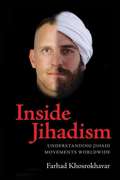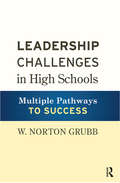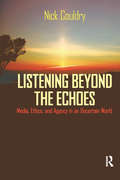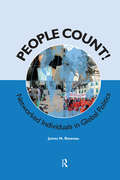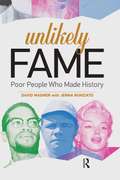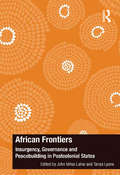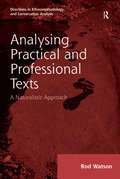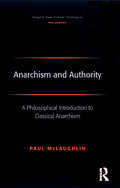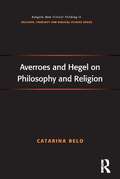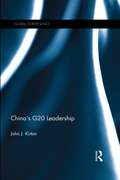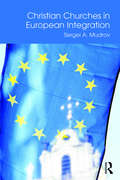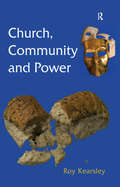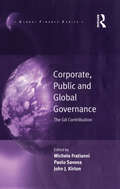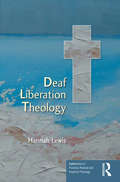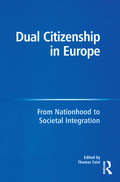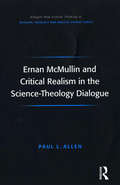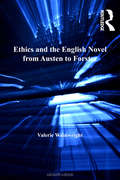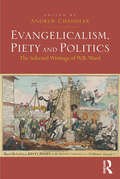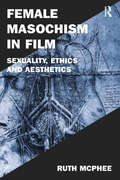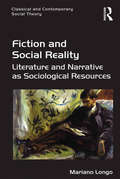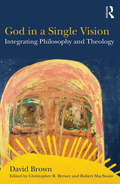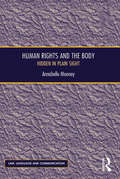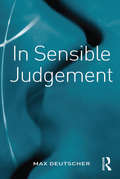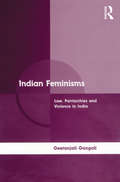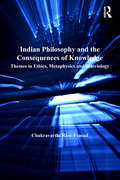Special Collections
Benetech’s Global Certified Accessible Titles
Description: Benetech’s GCA program is the first independent third-party EPUB certification to verify ebook accessibility. By creating content that is born accessible, publishers can meet the needs of all readers. Learn more: https://bornaccessible.benetech.org/
- Table View
- List View
Inside Jihadism
by Farhad KhosrokhavarJihad is the most organized force against Western capitalism since the Soviet era. Yet jihadism is multifaceted and complex, much broader than Al Qaeda alone. In the first wide-ranging introduction to today's rapidly growing jihadism, Khosrokhavar explains how two key movements variously influence jihadi activists. One, based in the Middle East, is more heavily influenced by Islamic religion and political thought. The other, composed of individuals growing up or living mostly in Europe and Western democracies including the United States, is motivated by secular as well as religious influences. Khosrokhavar interprets religious and lesser-known Arabic texts and the real-world economic and political dynamics that make jihadism a growing threat to Western democracies. Interviews with imprisoned jihadists on what motivated their plots and actions help the readers understand reality as seen by jihadists. The author concludes with recommendations to safeguard democracies from future jihadism.
Leadership Challenges in High Schools
by W. Norton GrubbPrincipals are responsible for an increasing range of duties in an era of school reform, standardized testing, and more. These responsibilities are even greater in high schools, which are many times larger and more complex than elementary and middle schools. Yet little has been written on the special challenges of high schools and their leadership. This book fills the gap by exploring the challenges specific to high schools, including their size and complexity, the special difficulties in improving instruction, the crucial role of high schools for students' futures, adolescent behavioral issues, and many more. Grubb shows how principals and other leaders can address the complexities of multiple pathways, or efforts to create theme-based trajectories through high school - one of the most promising high school reforms. Looking to the future, he offers alternative ways of preparing professionals for high schools, and the responsibilities of districts for improving high schools and their leadership.
Listening Beyond the Echoes
by Nick CouldryIn this book Nick Couldry, media and cultural theorist from the London School of Economics, asks what are the priorities for media and cultural research today - at a time of the intensified mediation of all fields of social life, threats to democratic legitimacy, and serious instability on the global political stage. The book calls for a "decentered" media research that rejects easy assumptions about media's role in holding societies together and instead looks more critically at the difference media make on the ground to the material conditions of our lives. In what detailed ways do media transform knowledge and agency in daily life? How do media contribute to the culture of democratic politics? And, most difficult of all, how can we live, ethically, with and through media? Couldry's previous work is well known for its breadth, ranging across media sociology, media theory and cultural theory. Here he draws also on political theory and ethics to develop a tightly-argued account of how media and cultural research must now reorient itself if it is to remain relevant and critical. Nick Couldry is Reader in Media, Communications and Culture at the London School of Economics and Political Science. He is the author or editor of five books including Media Rituals: A Critical Approach (Routledge 2003), The Place of Media Power (Routledge 2000) and (coedited with James Curran) Contesting Media Power (Rowman and Littlefield 2003).
People Count!
by James N. RosenauPeople Count! rests on a single but important premise: As the world shrinks and becomes ever more complex, so have people-as "networked individuals"-become ever more central to the course of events. This book seeks to depict a new era by analyzing the basic roles people occupy in their family, community, and society, including the wider world.
Unlikely Fame
by David WagnerThis unique book depicts the stories of Americans born in poverty, who achieved national or international fame. Accessible to students and lay readers, this scholarly study describes poverty as a disability that typically stunts important areas of growth in childhood. Wagner shows how poverty hampers individuals and groups for their entire lives, even many of those who emerge from poverty. Examples of individuals with difficult childhoods who faced residual lifelong challenges are presented in the stories of 27 Americans, including athlete Babe Ruth, birth control advocate Margaret Sanger, singer Billie Holliday, author Jack London, actress Marilyn Monroe, black leader Malcolm X, singer Johnny Cash, comedian Richard Pryor, author Stephen King, and entertainer Oprah Winfrey. In over 200 engaging and accessible pages, Unlikely Fame yields insight into successful individuals and how they coped, adapted and ultimately achieved success.
African Frontiers
by John Idriss Lahai and Tanya LyonsThrough a multidisciplinary approach, African Frontiers counters the superficial, Eurocentric and gender insensitive dominant discursive representation of Africa within the discourse of war and conflict management, and security and peace/nation-building. The chapters historicize and theorize the realities in postcolonial African states, and the ramifications on the continents future. Situating the study within the context of the prevailing cultural and geo-political realities in the postcolonial African states, the chapters illustrate the complex ways in which events and processes are experienced at the local level, and how these local realities in turn impact and shape the patterns of political and military engagement in Africa and beyond. Organized along three major themes: Insurgency, governance and peacebuilding, expert researchers from around the world contribute chapters on: Rebel and insurgent formations such as the RUF, the LRA, and Boko Haram; state governance and corruption; terrorism and counter terrorism; security and peacebuilding; focussing on the tensions and challenges facing post-conflict societies such as Sierra Leone, Rwanda, and the newest nation-state on the continent, South Sudan. This highly significant and topical study problematizes the impact of wars on African nations, as well as the epistemological framing of the local realities and fallouts of armed conflict on post-colonial states.
Analysing Practical and Professional Texts
by Rod WatsonAnalysing Practical and Professional Texts focuses on texts as constituents of human usage, showing how written documents and other 'texts' are integral to social organization. It reveals social organization itself to be not only textually-mediated in nature, but also textually-constituted, showing how texts - professional, technical or otherwise - as well as various social-scientific methodologies employ the resources of ordinary language. Theoretically sophisticated and illustrated with empirical examples, this book will be of interest not only to those with interests in ethnomethodology and conversation analysis, but also to social scientists and anthropologists concerned with text analysis, textual sense and the 'linguistic turn' in the methods of their own disciplines.
Anarchism and Authority
by Paul McLaughlinExamining the political theory of anarchism from a philosophical and historical perspective, Paul McLaughlin relates anarchism to the fundamental ethical and political problem of authority. The book pays particular attention to the authority of the state and the anarchist rejection of all traditional claims made for the legitimacy of state authority, the author both explaining and defending the central tenets of the anarchist critique of the state. The founding works of anarchist thought, by Godwin, Proudhon and Stirner, are explored and anarchism is examined in its historical context, including the influence of such events as the Enlightenment and the French Revolution on anarchist thought. Finally, the major theoretical developments of anarchism from the late-nineteenth century to the present are summarized and evaluated. This book is both a highly readable account of the development of anarchist thinking and a lucid and well-reasoned defence of the anarchist philosophy.
Averroes and Hegel on Philosophy and Religion
by Catarina BeloComparing Averroes’ and Hegel’s positions on the relation between philosophy and religion, this book explores the theme of the authorities of faith and reason, and the origin of truth, in a medieval Islamic and a modern Christian context respectively. Through an in-depth analysis of Averroes’ and Hegel’s parallel views on the nature of philosophical and religious discourse, Belo presents new insights into their perspectives on the relation between philosophical knowledge and religious knowledge, and the differences between philosophy and religion. In addition, Belo explores particular works which have not yet been studied by modern scholarship.
China’s G20 Leadership
by John J. KirtonKirton offers a comprehensive, systematic examination of China’s G20 approach, diplomacy and influence since the G20’s start as a forum for finance ministers and central bankers in 1999. This comprehensive reference tool works its way through China’s elevation to the leaders’ level with summits from 2008-2014, to the prospects for its Antalya Summit in November 2014 and above all China’s first summit as host in Hangzhou in the autumn of 2016. This book contains a full treatment of China’s role in the summits from 2011 to 2014, and China’s plans, role and prospects for the summits in 2015 and 2016. Analytically, it develops and tests at the level of a single member country the systemic hub model of G20 governance that was developed for and guided in Kirton’s 2013 book, G20 Governance for a Globalized World.
Christian Churches in European Integration
by Sergei A. MudrovAll too often religion is largely ignored as a driver of identity formation in the European context, whereas in reality Christian Churches are central players in European identity formation at the national and continental level. Christian Churches in European Integration challenges this tendency, highlighting the position of churches as important identity formers and actors in civil society. Analysing the role of Churches in engaging with two specific EU issues – that of EU treaty reform and ongoing debates about immigration and asylum policy – the author argues that Churches are unique participants in European integration. Establishing a comprehensive view of Christian Churches as having a vital role to play in European integration, this book offers a substantial and provocative contribution both to our understanding of the European Union and the broader question of how religious and state institutions interact with one another.
Church, Community and Power
by Roy KearsleyIn the era of 'post-Christendom', how can church as a sociological reality be switched on to the destructive dangers, yet constructive possibilities, of 'power' flowing in and around its community? Attuned to the current distrust of church power, this book creatively works out responses that could turn painful censure into a re-visioning of church power relations, helped by neglected critical studies. The approach exposes a complexity to power, and filters that insight into a theology of church. The book shows how lessons are available for a religious community from post-modern philosopher Michel Foucault and from recent feminism. The topic of power has universal importance in the study of religion, though the response to analysis and critique in this book is drawn specifically from Christian sources. Kearsley concludes with an exploration for a future renovated, self-critical, authentic and growing community, sensitive to power while remaining in line with classic Christianity.
Corporate, Public and Global Governance
by Michele Fratianni and Paolo SavonaThe intensifying pace of globalization has led to a questioning of the traditional approaches to governance at the corporate, national and international levels. The crash of the dot-com bubble and the outbreak of corporate accounting scandals in the United States, along with the debt burden of financial institutions in Japan and Europe, have led to demands for major reforms. Consequently, national governments are confronting stronger demands for new ways to regulate corporations to fulfil their social responsibilities and generate growth in a competitive world. This volume explores three central questions: what forms of corporate governance are most desirable for the globalizing world of the twenty-first century? What forms of public governance are most appropriate in this new age? And how well are the world's leading national governments pioneering the needed policies and practices? The book offers an analysis of the G8's role in assisting governments and corporations to work together to design and deliver a superior approach.
Deaf Liberation Theology
by Hannah LewisFollowing years of theology of deafness based on the premise that Deaf people are simply people who cannot hear, this book breaks new ground. Presenting a new approach to Deaf people, theology and the Church, this book enables Deaf people who see themselves as members of a minority group to formulate their own theology rooted in their own history and culture. Deconstructing the theology and practice of the Church, Hannah Lewis shows how the Church unconsciously oppresses Deaf people through its view of them as people who cannot hear. Lewis reclaims Deaf perspectives on Church history, examines how an essentially visual Deaf culture can relate to the written text of the Bible and asks 'Can Jesus sign?' This book pulls together all these strands to consider how worship can be truly liberating, truly a place for Deaf people to celebrate who they are before God.
Dual Citizenship in Europe
by Thomas FaistIn an age of terrorism and securitized immigration, dual citizenship is of central theoretical and political concern. The contributors to this timely volume examine policies regarding dual citizenship across Europe, covering a wide spectrum of countries. The case studies explore the negotiated character and boundaries of political membership and the fundamental beliefs and arguments within distinct political cultures and institutional settings which have shaped debates and policies on citizenship. The analyses explore the similarities and differences in the politics of dual citizenship, to identify the dominant terms of public debates within and across selected immigration and emigration states in Europe. The research demonstrates that policies on dual citizenship are not simply explained by different concepts of nationhood. Instead, concepts of societal integration, which may well be contested in a given polity, are extremely influential.
Ernan McMullin and Critical Realism in the Science-Theology Dialogue
by Paul L. AllenScientists, philosophers and theologians have wrestled repeatedly with the question of whether knowledge is similar or different in their various understandings of the world and God. Although agreement is still elusive, the epistemology of critical realism, associated with Ian Barbour, John Polkinghorne and Arthur Peacocke, remains widely credible. Relying on the lifetime work of philosopher Ernan McMullin, this book expands our understanding of critical realism beyond a permanent stand-off between the subjective and objective, whether in science or theology. Critical realism illuminates the subject and the objectively known simultaneously. Responding to criticisms made against it, this book defends critical realism in science and theology with a specific role to play in our understanding of God.
Ethics and the English Novel from Austen to Forster
by Valerie WainwrightComplicating a pervasive view of the ethical thought of the Victorians and their close relations, which emphasizes the domineering influence of a righteous and repressive morality, Wainwright discerns a new orientation towards an expansive ethics of flourishing or living well in Austen, Gaskell, Dickens, Eliot, Hardy and Forster. In a sequence of remarkable novels by these authors, Wainwright traces an ethical perspective that privileges styles of life that are worthy and fulfilling, admirable and rewarding. Presenting new research into the ethical debates in which these authors participated, this rigorous and energetic work reveals the ways in which ideas of major theorists such as Kant, F. H. Bradley, or John Stuart Mill, as well as those of now little-known writers such as the priest Edward Tagart, the preacher William Maccall, and philanthropist Helen Dendy Bosanquet, were appropriated and reappraised. Further, Wainwright seeks also to place these novelists within the wider context of modernity and proposes that their responses can be linked to the on-going and animated discussions that characterize modern moral philosophy.
Evangelicalism, Piety and Politics
by Andrew ChandlerW.R. Ward was one of the most influential historians of modern religion to be found at work in Britain during the twentieth century. Across fifty years his writings provoked a major reconsideration by historians of the significance of religion in society and its importance in the contexts of political, cultural and intellectual life. Ward was, above all, an international scholar who did much to repudiate any settled understanding that religious history existed in merely national categories. In particular, he showed how much British and American religion owed to the insights of Continental European thought and experience. This book presents many of Ward’s most important articles and gives a picture of the character, and extraordinary breadth, of his work. Embracing studies of John Wesley and the development of Methodism at large, the ambitions of Evangelicals in an age of international mission, the place of mysticism in evolution of Protestantism and the relations of churches and secular powers in the twentieth century, Andrew Chandler concludes that it was in such scholarship that Ward 'quietly recast the picture that we have of the past and drew our attention towards a far greater, more difficult and more interesting, landscape.'
Female Masochism in Film
by Ruth McPheeTheoretically and representationally, responses to heterosexual female masochism have ranged from neglect in theories that focus predominantly or only upon masochistic sexuality within male subjects, to condemnation from feminists who regard it as an inverted expression of patriarchal control rather than a legitimate form of female desire. It has commonly been understood as a passive form of sexuality, thus ignoring the potential for activity and agency that the masochistic position may involve, which underpins the crucial argument that female masochism can be conceived as enquiring ethical activity. Taking as its subject the works of Jane Campion, Catherine Breillat, Michael Haneke and Lars von Trier as well as the films Secretary (Steven Shainberg), Dans Ma Peau (Marina de Van), Red Road (Andrea Arnold, 2006) Amer (Hélène Cattat and Bruno Forzani), and Sleeping Beauty (Julia Leigh), Female Masochism in Film avoids these reductive and simplistic approaches by focusing on the ambivalences and intricacies of this type of sexuality and subjectivity. Using the philosophical writings of Kristeva, Irigaray, Lacan, Scarry, and Bataille, McPhee argues that masochism cannot and should not be considered aside from its ethical and intersubjective implications, and furthermore, that the aesthetic tendencies emerging across these films - obscenity, extremity, confrontation and a transgressive, ambiguous form of beauty - are strongly related to these implications. Ultimately, this complex and novel work calls upon the spectator and the theorist to reconsider normative ideas about desire, corporeality, fantasy and suffering.
Fiction and Social Reality
by Mariano LongoIn spite of their differing rhetorics and cognitive strategies, sociology and literature are often concerned with the same objects: social relationships, action, motivation, social constraints and relationships, for example. As such, sociologists have always been fascinated with fictional literature. This book reinvigorates the debate surrounding the utility of fiction as a sociological resource, examining the distinction between the two forms of writing and exploring the views of early sociologists on the suitability of subjecting literary sources to sociological analysis. Engaging with contemporary debates in this field, the author explores the potential sociological use of literary fiction, considering the role of literature as the exemplification of sociological concepts, a non-technical confirmation of theoretical insights, and a form of empirical material used to confirm a set of theoretically oriented assumptions. A fascinating exploration of the means by which the sociological eye can be sharpened by engagement with literary sources, Fiction and Social Reality offers a set of methodological principles according to which literature can be examined sociologically. As such, it will appeal to scholars of sociology and literary studies with interests in research methods and interdisciplinary approaches to scholarly research.
God in a Single Vision
by David BrownIn the ancient conversation between Western philosophy and Christian theology, powerful contemporary voices are arguing for monologue rather than dialogue. Instead of these two disciplines learning from and mutually informing each other, both philosophers and theologians are increasingly disconnected from, and thus unable to hear, what the other is saying, especially in Anglo-American scholarship. Some Christian philosophers are now found claiming methodological authority over doctrine, while some Christian theologians even deny that philosophy has its own integrity as a separate discipline. Against these trends, David Brown has argued over the past thirty years that philosophy and theology are both necessary in order to grapple with the reality of divine mystery and Christian faith. Neither discipline can be reduced to the other, and each has its own contribution to make for a full understanding of what Brown describes as 'a single vision' of God. In this volume, Brown addresses some key topics in philosophical theology, including the created order, experience and revelation, incarnation and redemption, and heaven and our communal destiny. Combining analytic clarity, doctrinal substance, and historical depth, this volume exemplifies Brown's project of truly integrating philosophy and theology. It thus provides an ideal introduction to this vital conversation for undergraduate and postgraduate students, as well as a connected argument of interest to specialists in both disciplines.
Human Rights and the Body
by Annabelle MooneyHuman Rights and the Body is a response to the crisis in human rights, to the very real concern that without a secure foundation for the concept of human rights, their very existence is threatened. While there has been consideration of the discourses of human rights and the way in which the body is written upon, research in linguistics has not yet been fully brought to bear on either human rights or the body. Drawing on legal concepts and aspects of the law of human rights, Mooney aims to provide a universally defensible set of human rights and a foundation, or rather a frame, for them. She argues that the proper frames for human rights are firstly the human body, seen as an index reliant on the natural world, secondly the globe and finally, language. These three frames generate rights to food, water, sleep and shelter, environmental protection and a right against dehumanization. This book is essential reading for researchers and graduate students in the fields of human rights and semiotics of law.
In Sensible Judgement
by Max DeutscherTaking its bearings from classic texts including Plato, Kant, Hegel and Arendt this thoughtful and intriguing book provides philosophical reflection on what it is to judge and what judgement achieves alongside, and sometimes in competition with, thinking and willing. Opening with the landmark Mabo High Court case in Australia and with detailed reference to other significant debates of judgement of the twentieth century Max Deutscher seeks to explore and explain approaches to the concepts of what is good, right and legal. Describing a connection between reason and grounds intrinsic to judgement he analyses and explores the tendency towards absolutism that displaces proper judgement. By weaving concrete instances of judgement with philosophical thought Deutscher provides a fascinating phenomenology of practices of judgement that should appeal to all readers with an interest in legal, philosophical and political thought.
Indian Feminisms
by Geetanjali GangoliContributing to debates on feminism, this book considers the impact made by feminists in India from the 1970s. Geetanjali Gangoli analyses feminist campaigns on issues of violence and women’s rights, and debates on ways in which feminist legal debates may be limiting for women and based on exclusionary concepts such as citizenship. She addresses campaigns ranging from domestic violence, rape, pornography and son preference and sets them within a wider analysis of the position of women within the Indian state. The strengths and limitations of law reform for women are addressed as well as whether legal feminisms relating to law and women's legal rights are effective in the Indian context. The question of whether legal campaigns can make positive changes in women’s lives or whether they further legitimize oppressive state patriarchies is considered. The recasting of caste and community identities is also assessed, as well as the rise of Hindu fundamentalism and the ways in which feminists in India have combated and confronted these challenges. Indian Feminisms will interest researchers and students in the areas of feminism, law, women’s movements and social movements in India, and South Asia more generally.
Indian Philosophy and the Consequences of Knowledge
by Chakravarthi Ram-PrasadThis book presents a collection of essays, setting out both the special concern of classical Indian thought and some of its potential contributions to global philosophy. It presents a number of key arguments made by different schools about this special concern: the way in which attainment of knowledge of reality transforms human nature in a fundamentally liberating way. It also looks in detail at two areas in contemporary global philosophy - the ethics of difference, and the metaphysics of consciousness - where this classical Indian commitment to the spiritually transformative power of knowledge can lead to critical insights, even for those who do not share its presuppositions. Close reading of technical Indian texts is combined with wide-ranging and often comparative analysis of philosophical issues to derive original arguments from the Indian material through an analytic method that is seldom mastered by philosophers of non-western traditions.
